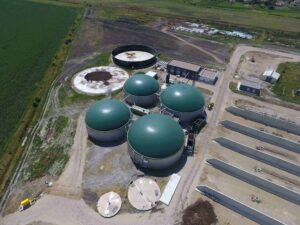Biomethane seen as key to cutting Serbia’s fossil fuels reliance

The Study on Biomethane Production Potential in Serbia was conducted in partnership with the Ministry of Mining and Energy and the Ministry of Environmental Protection, and funded through the EU-supported “EU for Green Agenda in Serbia” project, with contributions from Switzerland, Sweden and Serbia.
Jovana Joksimović, Assistant Minister for International Cooperation, European Integration and Project Management at the Ministry of Mining and Energy, said that renewable energy sources played an increasingly important role in strengthening Serbia’s energy security and independence.
She emphasised that biomethane was expected to take on a more prominent role in the country’s decarbonisation process.
According to Joksimović, the Integrated National Energy and Climate Plan (INECP) until 2030, with a vision to 2050, outlines the gradual introduction of biomethane into district heating systems and recognises its potential in the decarbonisation of transport.
She added that further development would be driven by regulatory improvements and demonstration projects aimed at reducing production costs and increasing the technical feasibility of biomethane transport through the existing gas network.
Yakup Beris, UNDP Serbia Resident Representative, said biomethane offered Serbia a domestic, sustainable and reliable energy source that could increase energy independence, reduce waste and lower emissions.
He noted that UNDP, together with national institutions and international partners, was working to create conditions for the construction of new biomethane facilities and the conversion of existing biogas plants.
He highlighted the importance of developing Serbia’s renewable energy capacity and circular economy in building a resilient, climate-responsible energy system.
Serbia’s potential feedstock for biomethane production includes agricultural waste such as manure, slaughterhouse by-products and crop residues, organic waste from households and the food industry, and sludge from wastewater treatment.
As the country expands its wastewater treatment capacity, the volume of sludge will rise, posing environmental and logistical challenges if not properly managed.
The study stresses that the waste Serbia currently generates could be transformed into valuable raw material for clean fuel production.
UNDP’s findings suggest biomethane could replace around 6% of Serbia’s total natural gas consumption by 2030, rising to more than 12% by 2050.
In industry and households, biomethane could supply almost 16% of natural gas needs by 2030 and more than a quarter by 2050, increasing the resilience of both the economy and the population during energy crises.
In the transport sector, biomethane could almost completely replace natural gas by 2028, with full substitution possible by 2030.
This would support the decarbonisation of public, municipal and heavy-duty transport, especially as manufacturers such as Scania and Volvo Trucks develop engines compatible with biomethane. Importantly, biomethane can be used in Serbia’s existing gas infrastructure without requiring any modifications.
The study identifies several wider benefits from scaling up biomethane production.
Greater domestic production would reduce Serbia’s reliance on imported natural gas and limit exposure to volatile international markets.
Rural economies would receive a boost, since biomethane production relies on locally sourced feedstock, providing new opportunities for farmers, cooperatives and small businesses.
Producers could also earn additional income through digestate, a natural fertiliser generated as a by-product of biomethane production.
If properly regulated and used as a soil improver, digestate could lower costs for agricultural producers by replacing more expensive mineral fertilisers.
Increased biomethane production would also help reduce pollution by capturing methane that would otherwise escape from landfills into the air, soil and groundwater, while mitigating the risk of landfill fires triggered by uncontrolled gas release.
The total investment required to develop Serbia’s biomethane sector is estimated at up to €550 million by 2030.
According to the study, annual revenues from biomethane production could exceed €250 million by the end of the decade, creating new opportunities in agriculture, supporting greener industrial production and generating local jobs within the energy sector.

















